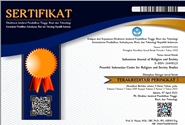Model Penyelenggaraan Pendidikan Inklusif bagi Penyandang Disabilitas Intelektual: Studi Kasus di DKI Jakarta
Abstract
This study aims to develop a model for the implementation of inclusive education for people with intellectual disabilities in DKI Jakarta. As a region that has local regulations on the protection of persons with disabilities, DKI Jakarta government has not yet been able to ensure the fulfillment of the education rights of children with intellectual disabilities. This study used a single instrumental case study approach and was carried out in DKI Jakarta. Data collection is done through in-depth interviews and textual analysis. The results show that social exclusion occurs because of cultural barriers due to stigma, labeling, prejudice, stereotypes, and structural barriers due to discriminatory policies. Both of barriers can be reduced by organizing inclusive education for persons with intellectual disabilities. The model for implementing inclusive education developed not only focuses on developing the life skills of individuals with intellectual disabilities, but also strengthening and developing the surrounding environment and society. Thus, children with intellectual disabilities can be independent and participate in society.
Keywords
Full Text:
PDFReferences
Alshemari, H. (2016). Inclusive Education and Students with Intellectual Disabilities (IDs) in the State of Kuwait: Are We Ready? Washington State University.
APA. (2000). American Pediatric Association.
Barnes, C. (2010). A brief History of Discrimination and Disabled People. Routledge.
BPS. (2015). Data Penyandang Disabilitas Intelektual. Jakarta.
Gabel, S. L., Cohen, C. J., Kotel, K., & Pearson, H. (2013). Intellectual disability and space: Critical narratives of exclusion. Intellectual and Developmental Disabilities, 51(1), 74–80. https://doi.org/10.1352/1934-9556-51.01.074
Gilmore, L., Campbell, J., & Cuskelly, M. (2003). Developmental Expectations, Personality Stereotypes, and Attitudes Towards Inclusive Education: Community and Teacher Views of Down Syndrome. International Journal of Disability, Development and Education, 50(1), 65–76. https://doi.org/10.1080/1034912032000053340
Goffman, E. (1963). Stigma:Note of the Management of spoiled identity. Lodon: Penguin.
Jahoda, A., & Markova, I. (2004). Coping with social stigma: People with intellectual disabilities moving from institutions and family home. Journal of Intellectual Disability Research, 48(8), 719–729. https://doi.org/10.1111/j.1365-2788.2003.00561.x
Kemendikbud. (2018). Data Pokok Pendidikan.
Kitchin, R. (1998). “Out of Place”, “Knowing One’s Place”: Space, power and the exclusion of disabled people. Journal of Disability and Society, 13(3), 343–356.
Levitas, R., Pantazis, C., Fahmy, E., Gordon, D., Lloyd, E., & Patsios, D. (2007). The Multi-Dimensional Analysis of Social Exclusion. https://doi.org/10.1177/1744987110370529
Link, B. G., & Phelan, J. C. (2001). Conceptualizing stigma. Annual Review of Sociology, 27, 363–385. https://doi.org/10.1146/annurev.soc.27.1.363
McCaughey, T. J., & Strohmer, D. C. (2005). Prototypes as an Indirect Measure of Attitudes Toward Disability Groups. Rehabilitation Counseling Bulletin, 48(2), 89–99. https://doi.org/10.1177/00343552050480020301
McKenzie, J. A., Pillay, S. G., Duvenhage, C.-M., Plessis, E. Du, & Jelsma, J. M. (2017). Implementation of Educational Provision for Children with Severe to Profound Intellectual Disability in the Western Cape: From Rights to Reality. International Journal of Disability, Development and Education, 64(6), 596–611. https://doi.org/10.1080/1034912X.2017.1313394
Nowicki, E. A., & Brown, J. D. (2013). “A Kid Way”: Strategies for Including Classmates With Learning or Intellectual Disabilities. Intellectual and Developmental Disabilities, 51(4), 253–262. https://doi.org/10.1352/1934-9556-51.4.253
Rapp, R., & Ginsburg, F. (2010). Enabling Disability: Rewriting Kinship, Reimagining Citizenship. In L. J. David (Ed.), The Disability Studies Reader (3rd editio, pp. 238–253). Routledge.
Roslina, D., & Rahayu, E. (2018). Peran Pendamping Dalam Meningkatkan Keberfungsian Sosial Penyandang Disabilitas Intelektual Pada Program Pelayanan Jarak Jauh Di Kecamatan Lembang Dan Cililin, Kabupaten Bandung Barat. Sosio Konsepsia, 7(2), 31–44. https://doi.org/10.33007/ska.v7i2.1167
Salmiah, S. (2010). Retardasi Mental. Medan, Sumatera Utara.
Scior, K., & Werner, S. (2016). Intellectual Disability and Stigma. London: Macmillan Publishers Ltd.
Snoyman, P., & Aicken, B. (2011). The concept of intellectual disability , and people with intellectual disability in Corrective Services NSW. Australasian Journal of Correctional Staff Development, 1–12.
UNESCO. (1998). Education for All 2000 Bulletin.
UNESCO. (2005). Guidelines for Inclusion: Ensuring Access to Education for All.
UNICEF. (2013). The State of the World’s Children 2013: Children with Disabilities. UNICEF.
United Nation. Convention on The Rights of People with Disability (2006).
Walker, A. and Walker, C. (1997). Britain Divided: The Growth of Social Exclusion in the 1980s and 1990s. London: Child Poverty Action Group.
Werner, K. S. and S. (2016). Intellectual Disability and Stigma: Stepping Out from the Margins. Palgrave Macmillan UK.
Werner, S., & Abergel, M. (2017). What’s in a label? The stigmatizing effect of intellectual disability by any other name. Stigma and Health, 3(4), 385–394. https://doi.org/10.1037/sah0000108
Wirutomo, P. (2013). Mencari Makna Pembangunan Sosial : Studi Kasus Sektor Informal di Kota Solo. Masyarakat, Jurnal Sosiologi, 18(1), 101–120.
DOI: https://doi.org/10.36256/ijrs.v1i1.26
Refbacks
- There are currently no refbacks.
Copyright (c) 2019 Indonesian Journal of Religion and Society

This work is licensed under a Creative Commons Attribution-NonCommercial 4.0 International License.
Indonesian Journal of Religion and Society (IJRS) Is Indexed By:

Indonesian Journal of Religion and Society (IJRS) is distribute under Creative Commons Attribution-NonCommercial 4.0 International License.













